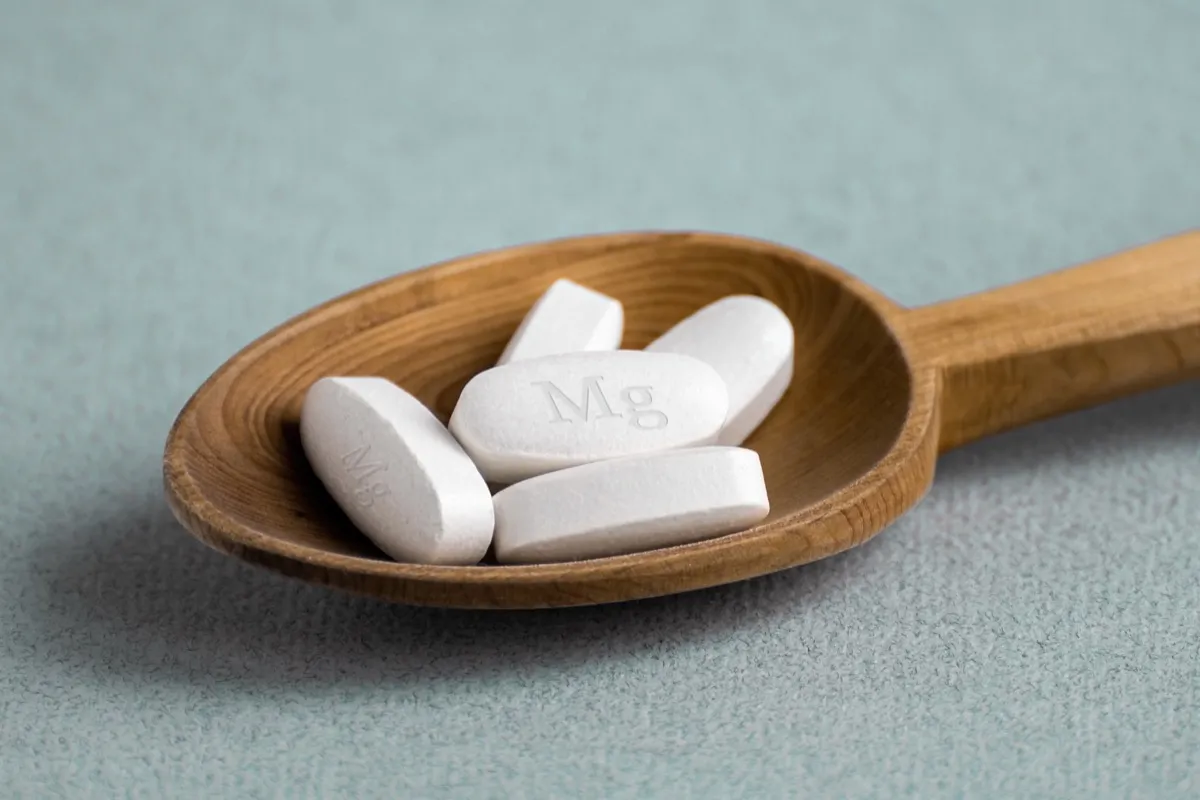9 Supplements That Can Damage Your Stomach, Doctors Say

At face value, it may seem that taking more dietary supplements will translate into better overall health. However, many people underestimate the potential for side effects associated with vitamins. When you take or combine certain supplements, you can suffer serious organ issues as a result. The stomach and gastrointestinal tract are commonly affected, in addition to the liver and kidneys.
According to the National Institutes of Health (NIH), supplement side effects are most likely to occur if you take them at high doses, take many supplements at one time, or take them instead of your prescribed medications.
“Many supplements contain active ingredients that can have strong effects on the body,” NIH experts write. “Always be alert to the possibility of a bad reaction, especially when taking a new product.”
Wondering which supplements are most likely to cause serious stomach symptoms? These are the nine vitamins to discuss with your medical team, doctors say.
RELATED: 5 Supplements That Can Damage Your Kidneys, Doctors Say.
1
Iron

Your body needs iron to make hemoglobin, a protein found in red blood cells that helps to transport oxygen from your lungs to the rest of your body. When you don’t get enough, you can develop iron deficiency anemia, which can cause a range of symptoms, including fatigue, weakness, dizziness, heart palpitations, and more. However, iron supplements can come with their own set of drawbacks, especially if you take them in high doses.
“Iron supplements are commonly used to treat and prevent iron deficiency anemia, but they can be harsh on the stomach lining and cause nausea, constipation, or stomach cramps,” says Raj Dasgupta, MD, chief medical advisor for Fortune Recommends Health.
David D. Clarke, MD, a board-certified doctor specializing in internal medicine and gastroenterology and the president of the Psychophysiologic Disorders Association, recommends speaking with your doctor before beginning a regimen of iron supplementation. He notes that you’re most likely to experience side effects when you take iron in excess of 17 mg daily.
2
Calcium

According to the NIH, 22 percent of men and 32 percent of women regularly take dietary supplements containing calcium. Besides improving bone health, this can also benefit the heart, muscles, and nerves.
“Calcium supplements are great for supporting bone health and preventing osteoporosis, but they can sometimes cause digestive issues like constipation or bloating,” says Dasgupta. “Calcium carbonate supplements, in particular, can lead to stomach upset and gas, especially when taken in large doses.”
Just how much is too much? Clarke says that doses exceeding 1,500 mg per day are most likely to damage your stomach or cause gastrointestinal symptoms. It’s also important to take dietary calcium into account when calculating your total.
RELATED: 12 Supplements You Should Never Take Together, Medical Experts Say.
3
Magnesium

Magnesium serves a range of important purposes in the body. “It’s involved in more than 300 chemical reactions in the body. Muscles need this mineral to contract; nerves need it to send and receive messages. It keeps your heart beating steadily and your immune system strong,” writes Harvard Health Publishing.
Dasgupta says that magnesium is likely safe when taken by mouth in the recommended daily amounts. However, most people can get all the magnesium they need through their diets by eating whole grains, green leafy vegetables, beans, nuts, and fish. Adding a supplement on top of that could cause stomach problems.
In particular, consuming too much “can potentially cause stomach upset, nausea, diarrhea, vomiting, and bloating,” Dasgupta warns.
4
Vitamin C (Ascorbic Acid)

Vitamin C, found in citrus fruits, kiwi fruits, tomatoes, peppers, and other fruits and vegetables, is good for boosting metabolism and immunity. However, it can also damage your stomach when consumed in excess.
“Too much can irritate your stomach lining, causing diarrhea, nausea, or abdominal cramps,” says Dasgupta. “If you already have stomach pain, the acidic nature of vitamin C can make it worse, especially when taken on an empty stomach.”
Because many brands of vitamin C supplements sell their products at high doses, this is a somewhat common problem. Clarke says that taking doses over 1,000 mg per day may lead to abdominal pain and diarrhea.
RELATED: 5 Supplements That Can Damage Your Liver, Doctors Say.
5
Fish oil

Fatty fish, avocados, chia seeds, and nuts are all good dietary sources of omega-3 fatty acids. Many people also take fish oil supplements, which can help ensure that you reach your quota without adding mercury to your diet.
However, Dasgupta says that fish oil can cause stomach upset in some individuals. “Fish oil is rich in omega-3 fatty acids, making it beneficial for the heart and reducing inflammation, but it might cause nausea, indigestion, or diarrhea, especially in high doses,” he says.
6
Green tea extract (GTE)

Green tea extract (GTE) is often advertised as a cure-all supplement that can lower blood pressure, improve cholesterol, stave off heart disease, reduce cancer risk, and more. However, it can also cause stomach problems, Dasgupta says.
“Green tea extract is rich in antioxidants and even touted for weight loss, but the caffeine in it can increase stomach acid production and irritate the stomach lining, potentially causing nausea or digestive issues, even liver damage in extreme cases,” he cautions.
Vanderbilt University Medical Center adds that some people taking green tea extract supplements experience “nausea, vomiting, diarrhea, abdominal pain and GI bloating.” They add, “Consumption of GTE on an empty stomach increases bioavailability and may be associated with increased adverse effects.”
RELATED: 6 Supplements You Should Never Take If You’re Over 60, Doctors Say.
7
Probiotics

Many people who take probiotics to improve their gut health don’t realize that, at least initially, they can cause the opposite effect.
“Probiotics support gut health by equalizing a healthy gut biome and improving digestion, but they might initially cause temporary digestive issues like gas, bloating, and stomach upset in some people, especially when they’re new to taking them,” says Dasgupta.
8
Vitamin A

Vitamin A, also known as retinol or retinoic acid, is an antioxidant that’s important for cell division, growth, vision, reproduction, immunity, and organ health. You can get vitamin A through your diet by eating liver, fish, eggs, dairy, and a range of fruits and vegetables, including green leafy vegetables, tomatoes, peppers, cantaloupes, and mangoes.
But if you consume too much of it, either through your diet or supplements, you may experience gastrointestinal symptoms. These can include nausea, loss of appetite, irritability, vomiting, abdominal pain, and diarrhea, Dasgupta says.
RELATED: 4 Supplements You Should Never Take on an Empty Stomach, Doctors Say.
9
Baby aspirin

Aspirin is technically a medication, not a dietary supplement. However, some people take a daily low-dose aspirin or other non-steroid anti-inflammatory drugs (NSAIDs) like ibuprofen alongside their supplement regimen to reduce their risk of heart attack, stroke, or blood clots.
Clarke warns that even in reduced 81 mg doses, this can cause potentially serious stomach problems. According to Johns Hopkins Medicine, aspirin can “irritate your stomach lining and can trigger gastrointestinal upset, ulcers and bleeding. And, because it thins your blood, it can be dangerous for people who are at higher risk of bleeding.”
“It’s important to note that these side effects are more likely to occur with high doses or long-term use of supplements,” Clarke tells Best Life. “Consulting with a healthcare provider is advised before starting any supplement regimen.”
Best Life offers the most up-to-date information from top experts, new research, and health agencies, but our content is not meant to be a substitute for professional guidance. When it comes to the medication you’re taking or any other health questions you have, always consult your healthcare provider directly.